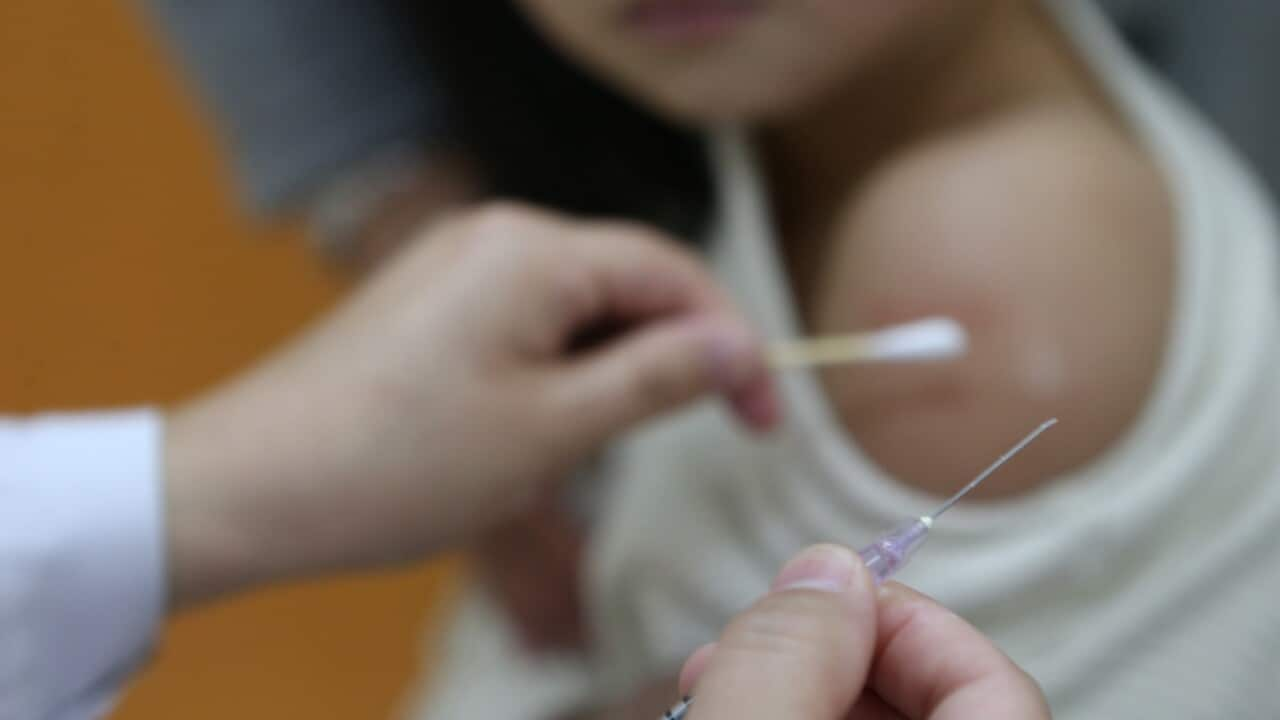Increased misinformation and the disruption of global supply chains due to COVID-19 are behind the biggest sustained drop in childhood vaccinations in three decades, a UN report said.
The percentage of children across the world who received three doses of the DTP vaccine against diphtheria, tetanus and pertussis (whooping cough) fell five percentage points between 2019 and 2021 to 81 percent, according to official data published this week by WHO and UNICEF.
This vaccine is used as a marker for immunisation coverage within and across countries, and has been available in Australia since the 1950s.

A girl gets a shot of the CoronaVac vaccine on the first day of a COVID-19 vaccination campaign for children ages 3 and 4 at a vaccination center in Rio de Janeiro, Brazil. Source: AP / Bruna Prado/AP
"We are witnessing the largest sustained drop in childhood immunisation in a generation. The consequences will be measured in lives," she added.
Some 25 million children missed out on one or more doses of DTP in 2021, two million more than those who missed out in 2020 and six million more than in 2019, putting a growing number of children at risk of preventable disease.
The slide was attributed to multiple factors including an increased number of children living in conflict zones, rising misinformation and service and supply disruptions from the COVID-19 pandemic, as well as lockdowns that limited outreach campaigns.
The pandemic "compelled parents and families to pick between putting food on the table and getting their children vaccinated," said Kate O'Brien, director of the WHO's immunisation, vaccines and biologicals department.
Ethiopia, India, Indonesia, Nigeria and the Philippines recorded the highest numbers of zero-dose children.
Australian childhood immunisations remain high, but a drop in teen vaccines
Vaccination rates for Australian one-year-olds, two-year-olds and five-year-olds have remained steady, despite pandemic pressures.
Data published by the Health Department shows coverage is about 94 per cent for these age groups.
But, health experts are worried for school-age children who might have missed the required shots, during school shutdowns in the past two years.
"There are some signs from Victoria that coverage for the HPV vaccine, which prevents certain reproductive cancers, may have reduced," said Professor Julie Leask, from the University of Sydney's School of Nursing and Midwifery.
"There was a study published last year that showed covered was 18 per cent lower in 2020 than in 2019, meaning the state that had the most severe lockdowns, with school learning at home, there was definitely an impact on adolescent vaccination."
Australia mirrored the worldwide trend in this age group. Globally, a quarter of the coverage of human papillomavirus (HPV) vaccines achieved in 2019 has been lost, a blow in the fight against cervical cancers.
Only 12 per cent of girls are fully protected, despite the first vaccines being licensed over 15 years ago.
Professor Julie Leask told SBS News state-based health departments could fix the drop in HPV vaccine coverage this year.
"They can always do a catch-up, the key is that states need to make sure that happens - that the kids in year eight and year nine are also offered the vaccine when the HPV vaccine nurses come around."
'Pay it forward': could Australia help the global effort?
Observers had hoped 2021 would be a year of recovery after the lockdowns of 2020, but instead it was the worst year for global DTP coverage since 2008, and came against a backdrop of rising rates of severe malnutrition in many parts of the world.
"The convergence of a hunger crisis with a growing immunisation gap threatens to create the conditions for a child survival crisis," the statement said.
First dose measles coverage dropped to 81 percent in 2021, also the lowest level since 2008.
Professor Robert Booy is a Sydney-based infectious diseases paediatrician. He said thousands of children could die from preventable diseases in the next 12 months across the globe.
"My view is that in Australia, where we do very well, we should give back and pay forward," he told SBS News.
"For 25 million children to be missing out on vaccines in 2021 is disastrous. Many thousands of children could die of vaccine-preventable diseases."
He has called on individuals to step up and sponsor vaccines, as competing factors such as famine, conflict and inflation limit the capacity of developing countries to vaccinate children.











